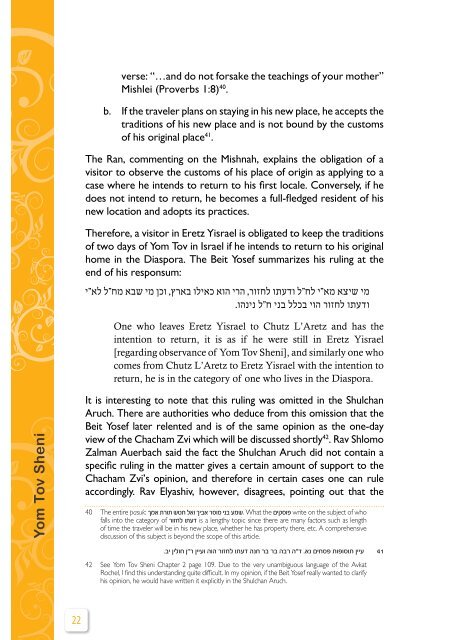Y om T o v Sheni Yom Tov Sheni - Chidushei Torah@NDS
Y om T o v Sheni Yom Tov Sheni - Chidushei Torah@NDS
Y om T o v Sheni Yom Tov Sheni - Chidushei Torah@NDS
Create successful ePaper yourself
Turn your PDF publications into a flip-book with our unique Google optimized e-Paper software.
Y<strong>om</strong> <strong>Tov</strong> <strong>Sheni</strong><br />
22<br />
b.<br />
verse: “…and do not forsake the teachings of your mother”<br />
Mishlei (Proverbs 1:8) 40 .<br />
If the traveler plans on staying in his new place, he accepts the<br />
traditions of his new place and is not bound by the cust<strong>om</strong>s<br />
of his original place41 .<br />
The Ran, c<strong>om</strong>menting on the Mishnah, explains the obligation of a<br />
visitor to observe the cust<strong>om</strong>s of his place of origin as applying to a<br />
case where he intends to return to his first locale. Conversely, if he<br />
does not intend to return, he bec<strong>om</strong>es a full-fledged resident of his<br />
new location and adopts its practices.<br />
Therefore, a visitor in Eretz Yisrael is obligated to keep the traditions<br />
of two days of Y<strong>om</strong> <strong>Tov</strong> in Israel if he intends to return to his original<br />
h<strong>om</strong>e in the Diaspora. The Beit Yosef summarizes his ruling at the<br />
end of his responsum:<br />
י”אל ל”חמ אבש ימ ןכו ,ץראב וליאכ אוה ירה ,רוזחל ותעדו ל”חל י”אמ אציש ימ<br />
.והנינ ל”ח ינב ללכב יוה רוזחל ותעדו<br />
One who leaves Eretz Yisrael to Chutz L’Aretz and has the<br />
intention to return, it is as if he were still in Eretz Yisrael<br />
[regarding observance of Y<strong>om</strong> <strong>Tov</strong> <strong>Sheni</strong>], and similarly one who<br />
c<strong>om</strong>es fr<strong>om</strong> Chutz L’Aretz to Eretz Yisrael with the intention to<br />
return, he is in the category of one who lives in the Diaspora.<br />
It is interesting to note that this ruling was <strong>om</strong>itted in the Shulchan<br />
Aruch. There are authorities who deduce fr<strong>om</strong> this <strong>om</strong>ission that the<br />
Beit Yosef later relented and is of the same opinion as the one-day<br />
view of the Chacham Zvi which will be discussed shortly 42 . Rav Shl<strong>om</strong>o<br />
Zalman Auerbach said the fact the Shulchan Aruch did not contain a<br />
specific ruling in the matter gives a certain amount of support to the<br />
Chacham Zvi’s opinion, and therefore in certain cases one can rule<br />
accordingly. Rav Elyashiv, however, disagrees, pointing out that the<br />
40 The entire pasuk: ךמא תרות שטת לאו ךיבא רסומ ינב עמש. What the םיקסופ write on the subject of who<br />
falls into the category of רוזחל ותעד is a lengthy topic since there are many factors such as length<br />
of time the traveler will be in his new place, whether he has property there, etc. A c<strong>om</strong>prehensive<br />
discussion of this subject is beyond the scope of this article.<br />
.בי ןילוח ן”ר ןייעו הוה רוזחל ותעד הנח רב רב הבר ה”ד .אנ םיחספ תופוסות ןייע 41<br />
42 See Y<strong>om</strong> <strong>Tov</strong> <strong>Sheni</strong> Chapter 2 page 109. Due to the very unambiguous language of the Avkat<br />
Rochel, I find this understanding quite difficult. In my opinion, if the Beit Yosef really wanted to clarify<br />
his opinion, he would have written it explicitly in the Shulchan Aruch.


